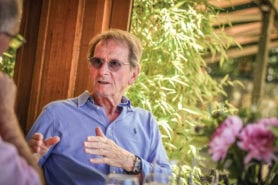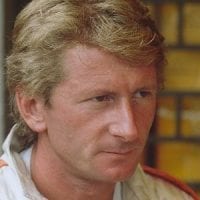Twice a Grand Prix winner but rarely the star, Jean-Pierre Jabouille holds a special place in Formula 1 history nonetheless. He was a talented engineer/driver who established himself relatively late as a cornerstone of Renault’s turbocharged F1 programme during the late 1970s. Even then his most significant and maiden triumph – the team’s breakthrough victory and the first for a forced injection engine in the 1979 French GP – was overshadowed by a dice in his wake.
Education and early racing career
The tall, fair haired Jabouille studied modern art at the Sorbonne University in Paris and was already in his twenties when he raced for the first time. A mix of hillclimbs and the one-make Renault Eight Gordini series followed with Jabouille always engineering his own car.
Initial Formula 3 promise with private Brabham and Matra chassis alike led to an offer from Automobiles Alpine for 1969. He continued as its test driver for several seasons to come. Formula 2 races with Pygmée (1970) and Tecno (1971) included some promise but few results of note except finishing second in a non-championship race at Pau in 1971.
He raced for John Coombs’ Elf-sponsored team for the next two seasons and his March 722-Ford was a fine second at Mantorp Park in 1972. But he was too often relegated to the team’s slower Alpine-Ford chassis during that time – much to Jabouille’s frustration.
Formula 2 success and F1 debut
Third in the 1973 and 1974 Le Mans 24 Hours for Matra-Simca, he won his first F2 race at Hockenheim in 1974 and his Alpine A367-BMW was a factor all year. Jabouille finished fourth in the F2 Championship and also tried his hand in F1 that year but failed to qualify for Williams and Surtees in France and Austria respectively.
Jabouille designed his own old-fashioned spaceframe Elf 2J-BMW for the 1975 F2 season and he came fifth overall after winning at the Salzburgring. His Tyrrell 007-Ford also finished 12th on his GP debut in the 1975 French GP at Paul Ricard.
Frustrated by his Schnitzer BMW engines during 1975, Jabouille switched to Renault-power for the 1976 European F2 Championship. Finally, the veteran won the title at the final round after narrowly beating impressive newcomer René Arnoux by a single point.
Developing the Renault turbo
Already in his mid-thirties, Jabouille was chosen as the development driver for Renault’s F1 return and he was behind the wheel for its debut in the 1977 British GP. Initial development of the turbocharged 1500cc engine and early races were hampered by woefully poor reliability although the power and promise was soon evident.
Fourth in the 1978 United States GP, Jabouille was joined by Arnoux for the following season. His team-mate may have shown prodigious speed in qualifying but it was Jabouille who scored that historic first victory at Dijon-Prenois although the 1979 French GP is best remembered for the wheel-to-wheel battle for second between Arnoux and Ferrari’s Gilles Villeneuve. Jabouille also won the 1980 Austrian GP although that campaign ended early when he badly broke his right leg in Canada.
Unhappy Formula 1 return
Renault decided to replace Jabouille’s experience with the youthful promise of Alain Prost for 1981 and so he joined Ligier. Not fit enough to return at the start of the season, Jabouille struggled once he was back. His Ligier JS17-Matra did not qualify for three of his six races for the team before he was replaced after the Spanish GP.
That spelled the end of his 49-race GP career but Jabouille eventually returned to race in saloons and sports cars. The latter included a fifth place finish in the 1989 Le Mans 24 Hours with a works Sauber C9-Mercedes and his Peugeot 905 was third in 1992 and 1993.
Jabouille replaced Jean Todt as manager of Peugeot’s motorsport activities in 1994 but he paid for the ill-fated F1 engine programme by leaving in January 1996. He formed JMB Racing with Jean-Michel Bouresche in 1997 and joined Philippe Alliot’s Force One GT team as Technical Director in 2002. He continued to race for his own team in French GTs but eventually retired from competition in 2005.
Jabouille died on February 2, 2023 at the age of 80.




